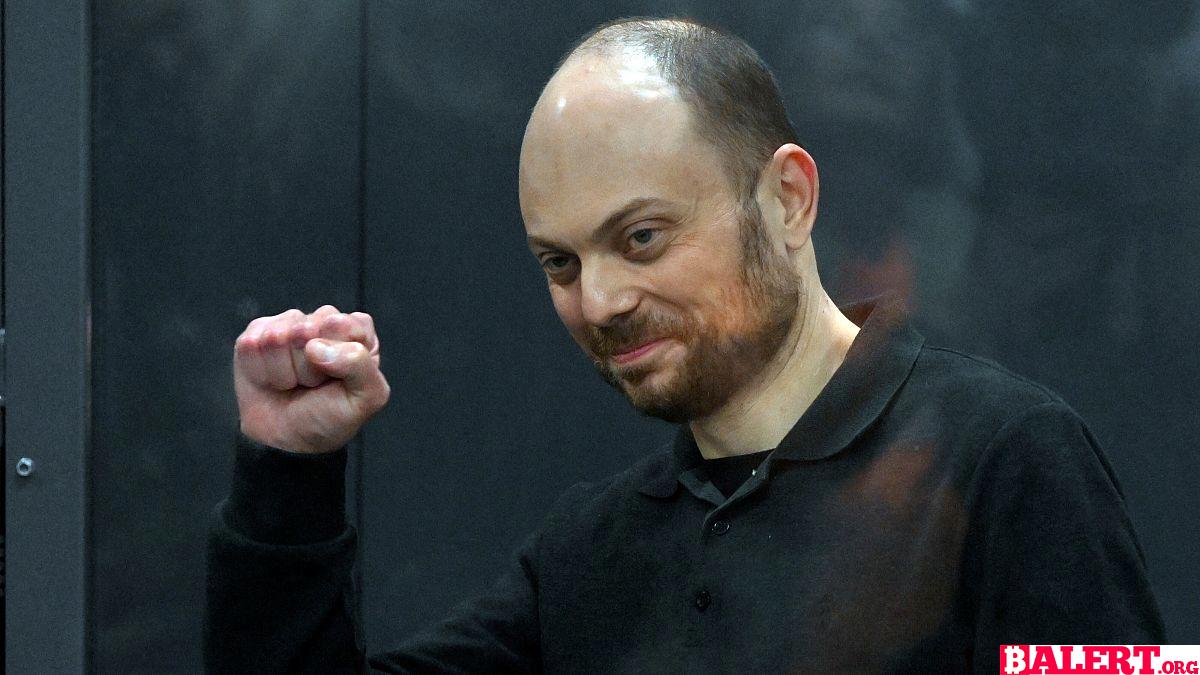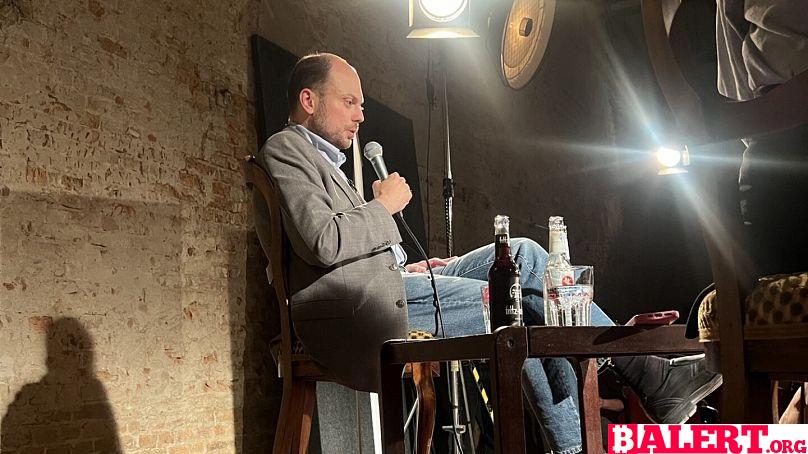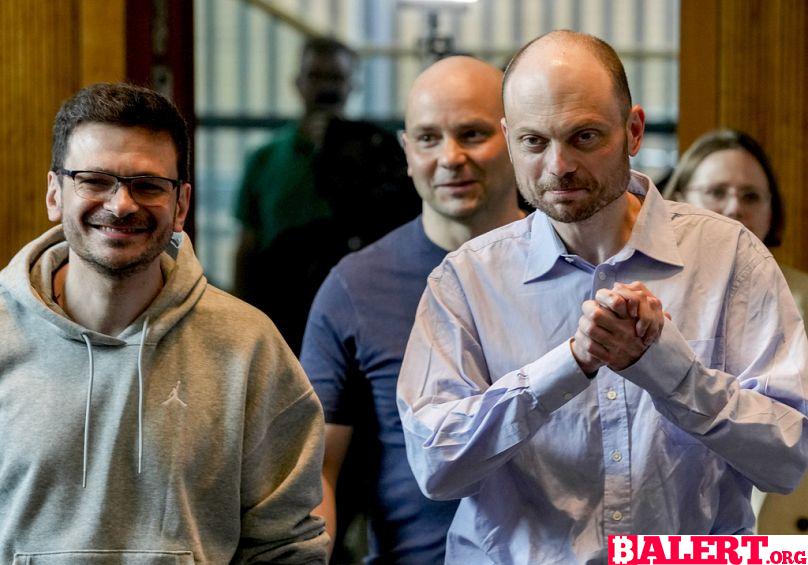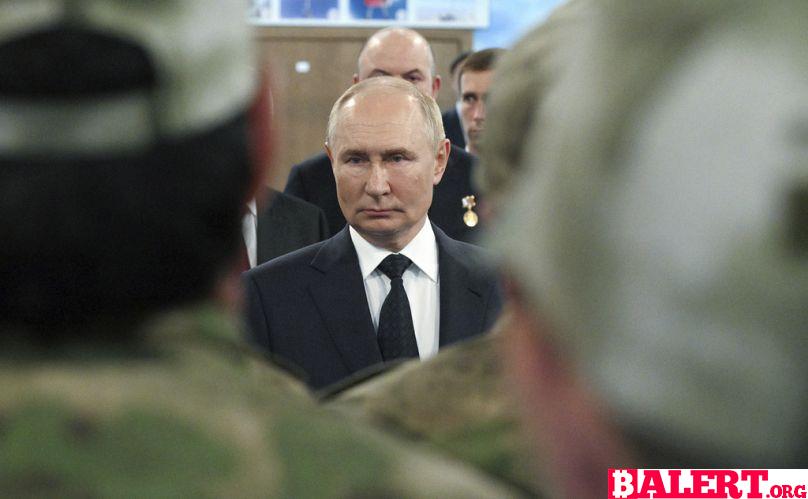World
Vladimir Kara-Murza: Reflections on Imprisonment and Hope for a Free Russia
Explore Vladimir Kara-Murza’s poignant reflections on his imprisonment and his unwavering hope for a free Russia. Delve into his courageous journey and the fight for democracy amidst adversity.

Surreal Freedom: The Journey of Vladimir Kara-Murza

“At first, I thought they were going to shoot me; then it felt like I was living in a gripping film.” Speaking in Berlin, Russian opposition activist Vladimir Kara-Murza reflected on his release from a Russian prison this summer, which marked the largest prisoner exchange between Western nations and Moscow since the Cold War ended. In a brick structure reminiscent of a medieval castle, he recounted his experiences during his imprisonment in the Siberian city of Omsk and shared his aspirations to help rebuild Russia from afar.
Kara-Murza may be relatively safe now, yet upon leaving Russia, he received a cautionary message not to divulge “too much.” “You know what can happen otherwise,” he was warned. However, now that he is a free man, he expressed to his supporters in the dimly lit, dungeon-like hall that the entire experience feels simply surreal.
The circumstances surrounding his detention and release evoke memories of Russia in the 1950s. During the twilight years of Josef Stalin’s regime, the so-called “intelligentsia”—Russia’s intellectual elite, to which Kara-Murza’s ancestors belonged—met clandestinely to discuss topics that were strictly forbidden, risking banishment to the gulag.

In April 2022, he was arrested and handed a 25-year sentence for treason and spreading false information about the Russian military. At that moment, he did not believe he would ever see freedom again.
Related
- Exchanged opposition activists freed from Russia pledge to return and hope for a brighter future
- Former spies speak on Russian TV following massive prisoner exchange
“In prison, my only companions were cats,” Kara-Murza shared, illustrating his daily life in solitary confinement, where he spent the majority of his two-and-a-half-year sentence. Throughout his imprisonment, he managed to speak with his wife only once and his children just twice. Confined to a minuscule cell, he often found himself staring at a blank wall. “You can go mad,” he lamented. “You start to forget words.” To avoid losing his sanity, he ordered a book from the prison’s meager library and embarked on learning Spanish.
Free at Last
When he was unexpectedly escorted out of prison, Kara-Murza’s first instinct was that the guards were about to execute him. However, the reality was much different. From Tomsk, he was flown directly to Moscow and then to Ankara. It wasn’t until he and the other prisoners were escorted to buses bound for a Moscow airport that he realized he was part of a prisoner exchange. There, he encountered familiar faces, including Russian opposition politician Ilya Yashin, who had also been freed. “You look like crap,” Yashin remarked as they reunited after two and a half years apart. (Yashin was present in the front row among the audience in Berlin, grinning as Kara-Murza recounted his ordeal.)
Upon arriving in Ankara, a woman handed Kara-Murza a phone. On the other end was none other than US President Joe Biden. “During my time in solitary confinement, I had minimal contact with anyone. I had barely spoken a word in Russian for two and a half years, let alone in English,” Kara-Murza chuckled. Hearing the voices of his wife and children again for the first time in ages overwhelmed him. It was a moment that felt utterly surreal.

Old Mistakes
Kara-Murza was recently welcomed to Germany by Chancellor Olaf Scholz. The two engaged in discussions about Russia’s future and the thousands of political prisoners who remain incarcerated under dire conditions in Russia and Belarus. He emphasized his desire to help build up Russian civil society from exile, aiming to give a voice to those Russians who “do not wish to inhabit an archaic, isolated authoritarian pseudo-empire, but rather a civilized European state.”
“The only thing necessary for evil to triumph is for good people to do nothing,” Kara-Murza recalled, quoting Alexei Navalny. “I stand firmly behind every word. Every totalitarian regime only exists with the complicity of ordinary people.” But how did Russia arrive at its current state of repression?
According to Kara-Murza, this is the result of two significant mistakes made in the 1990s. One mistake originated within Russia, while the other came from the West. He asserted that Russia failed to confront its past. “If evil is not condemned and punished, it will inevitably return,” Kara-Murza explained. “Countries that have successfully transitioned from totalitarianism have undergone a moral reckoning. Germany was compelled to do so after 1945, allowing people to examine archives and confront their history.” Unfortunately, this reckoning has yet to occur in Russia.
The second mistake, he argued, was made by the West. Other Eastern European nations found it significantly easier to recover from their Soviet pasts, forming democracies, because they received strong external support. They were welcomed back into Europe. However, during the 1990s, the West was not prepared to accept and integrate a democratic Russia.
“Russia must certainly learn from its past mistakes. However, it is equally vital that the West is prepared to embrace a new, democratic Russia that has learned from its errors. Russia is inextricably linked to Europe—both culturally and mentally.”
“If our vision is a peaceful, free, and united Europe, then this can only be achieved with the participation of a peaceful and liberated Russia.”
Death Would be Too Lenient a Punishment
Russia is a multi-ethnic nation, yet it has yet to transform into “a truly federal state,” Kara-Murza emphasized. Many Russians harbor fears that the country could disintegrate, similar to the Soviet Union, which leads them to support authoritarian leadership. “I don’t believe such fragmentation will occur,” Kara-Murza asserted. He suspects that stronger regulatory mechanisms and laws will emerge to protect the identities of ethnic minorities within the nation.
Regions should have the right to speak their native languages and teach them to their children in schools, he contended. “Russia is currently pursuing a centralized policy. This is fundamentally misguided.”
For Russia to achieve these freedoms and more, Vladimir Putin must relinquish his grip on power. “Perhaps Russia will only find freedom when he finally dies,” someone from the audience remarked. However, Kara-Murza expressed a desire for Putin to remain alive. “I want to see him in the dock. I want him to be held accountable for all he has done over the past 25 years.”
“I know he will answer for his sins,” Kara-Murza declared, raising his index finger towards the sky, “but I want him to be held accountable here too. He must take responsibility for Nemtsov, for Navalny, for the Ukrainian children who lost their lives. Death would be too lenient a punishment.”
Truth and Hope
Kara-Murza believes that everyone can contribute to a free Russia. “There is ample work for all of us,” he promised. “It is essential to maintain dialogue, to engage with people, and to persuade them so that when Russia is ready for change, everything that has been destroyed in the past 25 years can be restored.”
“We cannot afford to sever our connection to our beloved Russia—the Russia of Boris Nemtsov and Alexei Navalny.”
Meanwhile, Kara-Murza dreams of visiting Tomsk, the city where he endured such a long imprisonment. “It’s a peculiar dream,” he admitted. Despite having traveled to many Siberian cities, he had never seen Tomsk outside the confines of his tiny prison cell, where he received thousands of letters each month. “In their letters, people often asked me why I remained so optimistic and hopeful. I always replied that I don’t merely hope; I know. The truth is on our side.”
World
Dominique Pelicot Testifies in Harrowing Rape Trial
Join us as Dominique Pelicot courageously testifies in a harrowing rape trial, shedding light on the complexities of trauma and justice. Her powerful story raises crucial questions about the legal system and the importance of support for survivors.

Dominique Pelicot Takes the Stand in Shocking Rape Trial
In a courtroom drama that has captivated France and garnered international attention, Dominique Pelicot, the man at the center of a harrowing rape trial, finally addressed the court. With tears streaming down his face, he recounted how his wife had been instrumental in helping him cope with a tumultuous past marked by trauma. He revealed that he had endured a sexual assault at the tender age of nine while hospitalized, and he also witnessed a gang rape during his teenage years while working as an apprentice electrician on a construction site.
“She didn’t deserve this, I acknowledge that,” Mr. Pelicot stated, his voice barely audible as he struggled to convey his emotions. The gravity of the situation weighed heavily on him, and the courtroom fell silent, straining to catch his every word.
Now 71 years old, Mr. Pelicot faces serious allegations of drugging his wife, Gisèle Pelicot, whom he has been married to for half a century, over a span of nearly ten years. Prosecutors contend that he used drugs to render her comatose, allowing him to rape her repeatedly. Furthermore, authorities allege that he went so far as to invite numerous men into their home, facilitating a nightmarish scenario where they, too, engaged in the assault of his wife.
Overall, 51 men, including Mr. Pelicot, are on trial concurrently, primarily facing charges related to the aggravated rape of Ms. Pelicot. Among them, one individual has already pleaded guilty to similar crimes, admitting to drugging his own wife to assault her and inviting Mr. Pelicot to partake in the horrific act while she was incapacitated.
Mr. Pelicot’s unexpected testimony came after a tumultuous start to the trial. Just a week in, he was stricken with severe health issues that forced him to miss four consecutive days in court. The head judge ultimately decided to postpone proceedings, as Mr. Pelicot was diagnosed with kidney stones, a kidney infection, and prostate complications, adding yet another layer of complexity to this already harrowing case.
World
Meta Bans Russian State Media Outlets from Social Media Platforms
Explore the implications of Meta’s decision to ban Russian state media outlets from its social media platforms. Understand the impact on information dissemination and the ongoing battle against misinformation in the digital landscape.

Meta Imposes Global Ban on Russian State Media Outlets
In a significant move, Meta Platforms, Inc., the parent company of Facebook, has announced the prohibition of Russian state media outlets, including RT (Russia Today) and Rossiya Segodnya, from all its social media platforms. The decision stems from the company’s concerns regarding the deceptive strategies employed by these media organizations to execute covert influence operations across the internet.
Meta made this announcement on Monday, emphasizing that the ban will be enforced worldwide across its various platforms, such as Instagram, WhatsApp, and Threads. The rollout of this ban is expected to take place over the coming days.
Statement from Meta
A spokesperson for Meta elaborated on the decision, stating, “After careful consideration, we have expanded our ongoing enforcement actions against Russian state media outlets. As a result, Rossiya Segodnya, RT, and other affiliated entities are now banned from our applications globally due to their involvement in foreign interference activities.”
For further insights into this development, watch the video in the player above.
World
Trump Recalls Alleged Assassination Attempt While Golfing
Explore Donald Trump’s chilling recollection of an alleged assassination attempt he experienced while enjoying a round of golf. Delve into the tense moments and his reflections on safety, fame, and the unpredictability of public life.

In a recent interview on the social media platform X, Republican presidential nominee Donald Trump recounted a harrowing incident he claims to have experienced while playing golf. Trump described how, during a peaceful Sunday morning round with friends, the tranquility of the day was abruptly shattered by the sound of gunfire in the air.
“It was a beautiful day, everything was just perfect,” Trump reflected. “Then all of a sudden, we heard shots being fired—probably around four or five in total.” He went on to explain that a Secret Service agent was the first to spot the suspect, who was allegedly armed with an AK-47, a powerful assault rifle.
“The agent saw the barrel of the weapon and immediately took action, returning fire at the barrel and aiming in the direction of the bushes,” Trump detailed. “I would have loved to have sunk that last putt, but we decided it was best to leave the scene promptly.”
Trump expressed his gratitude towards the agents and a vigilant civilian who aided in tracking down the suspect, who was eventually apprehended following a high-speed chase.
Suspect Faces Multiple Federal Gun Charges
The FBI has identified the suspect as Ryan Wesley Routh, accusing him of targeting Trump during his time at the golf club in West Palm Beach, Florida. According to an FBI report, Routh had allegedly hidden among the hedges of the golf course for an astonishing 12 hours. Authorities discovered an SKS-style assault rifle, a GoPro camera, and a bag of food at the scene.
The 58-year-old Routh is now facing two serious federal gun charges. If convicted on both counts, he could face a combined maximum sentence of 20 years in prison. Notably, neither of the charges is directly related to an assassination attempt. The first charge pertains to possessing a firearm despite a prior felony conviction, which carries a potential 15-year sentence, a fine of $250,000 (€225,000), and three years of supervised release.
The second charge involves possession of a firearm with an obliterated serial number, which could result in a five-year prison term, the same financial penalties, and also three years of supervised release. As the investigation continues, additional charges could be forthcoming.
While the motive behind Routh’s actions remains unclear, his digital footprint reveals strong political affiliations, particularly concerning issues surrounding Ukraine and China. Routh consistently expressed support for Ukraine across various social media platforms, even claiming to have orchestrated a recruitment scheme for international volunteers aiming to assist Ukraine in its fight against Russia’s invasion. This behavior has been denounced by Ukrainian soldiers and members of the International Legion, who disavowed Routh’s actions and motives.
-

 Business5 months ago
Business5 months agoThe Significance of Jackson Hole: A Central Banking Tradition
-

 Tech4 months ago
Tech4 months agoNew Leaks and Features About the Samsung Galaxy S25 Ultra
-

 Business7 months ago
Business7 months agoObituary: Dan Collins
-

 Article7 months ago
Article7 months agoCreative Design Applications Developed with Artificial Intelligence
-

 Business4 months ago
Business4 months agoBhutan’s Strategic Investment in Bitcoin: A New Era for the Himalayan Kingdom
-

 World4 months ago
World4 months agoThierry Breton Resigns: Impact on European Union Leadership
-

 Gaming4 months ago
Gaming4 months agoNew Details and Trailer Released for Dead Rising Deluxe Remaster
-

 Gaming4 months ago
Gaming4 months agoNew Details for Alan Wake 2 and PlayStation 5 Pro Announcement












